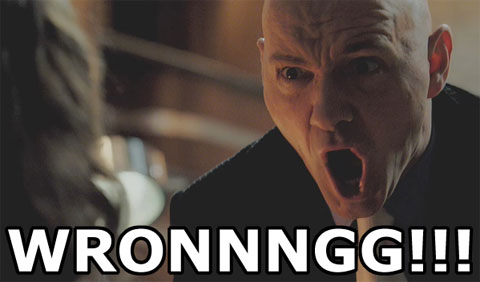Let's start at the top with this post...and let's start by me shattering an illusion.
Many DMs see themselves as this...
 |
| Complex?! Hell no! It's simple! |
And, if you think about it, it makes sense. You have ultimate power, you shape the world, you populate it...that means your God, right? No...you're this...
You see, the misunderstanding taking place is that the DM, at the table, is in an active role. On the contrary, one you sit down, you have to take on a passive role just like the NES. The game is loaded and the player picks up the control...at that point, you're supposed to act as nothing but the interface for the players. You are there for them to experience the world through. Remember, without a DM, there IS NO GAME because the players have no methodology to actually interact with the world.
Think about it...
What can the players do without the DM to validate action they take? At best, they can speak to one another...but they can't accomplish anything tangible in the world. They cannot shake, they cannot rattle, they cannot roll. It is this need for a DM that so many conflate with ultimate power. After all, this means the DM controls everything, right? No, the DM does not control the game any more than the NES system controls the game. Think about the controller...the controller of the video game system doesn't actually control the game. It is there as an interface for the PLAYER to make things happen in the game. Really, calling it a "controller" is a misnomer...it is just a convenient one.
Realize now that, without the players, no amount of design, effort or brilliance matters at all...it is the equivalent of a game console sitting, plugged in, turned on, with a game loaded...and no one to play it. The game cannot play itself. The NES cannot play the game.
That out of the way? We clear? You're not God. You're an interface.
 |
| Take the pill. It's good for you even if it's a bitter truth. |
When one gives up worrying about being God they give up worrying about being infallible. It also lets you get rid of the insidious little game-killer called "intent". You see, the NES doesn't have any intent when you are playing it. It's only job is to run the game as flawlessly as it can. ALL that it need do is not crash, freeze or glitch.The game does not care if you play the game according to it's vision. It does not care if you use the flute to skip levels 2-4...
 |
| Seriously, try this shit in some games and the DM will flip his wig! |
This is, of course, where many DMs fail. They assume that the effort and work that they put in to create the games content, that complete authority, should continue when they sit down at the table. Guess what? Help me out with this one, Lex Luthor...
 |
| Ahhh the only good part of this film... |
The hardest part of all of that though is letting go. You have to let go and allow what will happen to happen. It means you have to give up the joy of seeing intent acted upon and instead embrace the joy of seeing others acting upon their intent to interact with what you present. The DM must be the least selfish person at the table. They must be the person that wants to have the least attention on them. To many DMs that is a completely foreign concept. This...is the hard part...
Consider that a DM acts, first and foremost, as a referee and judge. Tell me, are the referees in football, basketball, soccer, wrestling or anything else...the center of attention? Do the cameras focus on the ref? Do the commentators speak of the referees constantly? Is the judge at a trial the center of attention? Is the jury focused entirely on the judge? Do the attorneys speak primarily to the judge? The answer to all of those questions is obviously no. With a DM is should be no different. You are not the center of attention...the GAME IS. As discussed previously, what moves the game? The players!
 |
| Learn from this duck! |
The best part is, when you give up worrying about where the "story" will be twenty sessions from now, you free yourself up to make the game run as well as possible. You can make sure you know the rules. You can spend time fleshing out the players surroundings as they are NOW rather than as they must be in the future. After all, if you have no desires regarding the players actions there is no need for you to preordain what will happen. What will occur will occur.
Now, this post was originally supposed to be part 3 of this series...but I felt as if I needed to frame the mind-set a DM needs to have to succeed and to allow their players to thrive. Part 3 will be coming up soon.

Great post. I've found that the more I act like a computer, the better the game goes. People just can't take the authority of a friend of theirs very seriously if they're actually acting like their friend. There have been a few times when the game has benefited from me throwing a few hooks at the players, just to make them aware of what possibilities there are, and sometimes I'll smile when players do something clever or shake my head if they're about to do something stupid. When I relate to players one-on-one at the table though, I have to keep it separate from my identity as DM. It helps to almost act like a spectator, just as ignorant of the outcome as the players. When they really feel like they're in control is when they have the strongest emotional attachment to the game, and when they make the most interesting choices. And that's what any competent DM wants.
ReplyDeleteI wrote a post kind of similar to this one for a player in my group who's looking to learn to DM, but seems intent on railroading, and also directed him here. I also talked about when and how to go beyond your role as referee, without making decisions for players. I think a lot of new DMs give up on the open ended sandbox type of game because they see it as giving up their creativity, when they really just have to apply it in a different and more intelligent way. You might wanna check it out, maybe you'll have some disagreements or additions to make:
ReplyDeletehttp://alonzocredanzo.wordpress.com/2013/04/19/how-to-run-a-game/